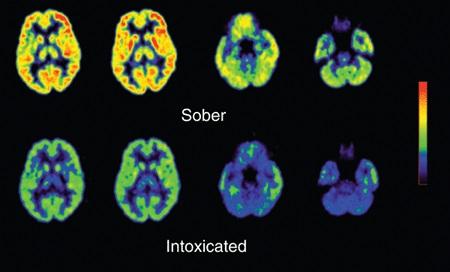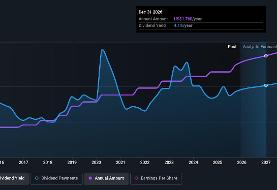Even moderate drinking can cause memory loss and depression

Alcohol drinkers often cite evidence that "moderate" or "Social" drinking is not harmful. I have yet to see many people who drink in "moderation." I have also seen strong evidence that even "moderate" drinking can be seriously harmful:
1. A research paper published by BMJ Group shows that number of Purkinje brain cells consistently decreases with increasing daily alcohol intake but not with age. A long term "moderate" consumption (average of 41 to 80 g alcohol daily) was associated with a significant average loss of 15.2% in Purkinje cells. The research article concludes that long term intake of "moderate" doses of alcohol daily for 20- 30 years may damage the cerebellum before the onset of macroscopical atrophy in these brain areas.

2- An article published by Royal College of Psychiatrists blames long term alcohol consumption on psychosis -hearing voices when there is nobody there - and dementia - memory loss, rather like Alzheimer's dementia. The paper acknowledges that more than 9 out of 10 people in the United Kingdom drink alcohol, and it has become part of the culture. About 1 in 3 men and 1 in 6 women in the United Kingdom develop some sort of health problem caused by alcohol.
Alcohol can be a very effective way of feeling better for a few hours. If you are depressed and lacking in energy, it can be tempting to use alcohol to help you keep going and cope with life. The problem is that it is easy to slip into drinking regularly, using it like a medication. The benefits soon wear off and the drinking becomes part of a routine. You start to notice that:

•instead of choosing to have a drink, you feel you have to have it
•you wake up with shaky hands and a feeling of nervousness
•you start to drink earlier and earlier
•your work starts to suffer
•your drinking starts to affect your relationships
•you carry on drinking in spite of the problems it causes
•you find you have to drink more and more to get the same effect (tolerance)
•you start to ‘binge drink’ (see below) regularly.
Self-harm and suicide caused by depression, are much commoner in people with alcohol problems. It seems that it can work in two ways:
•you regularly drink too much including (including ‘binge drinking’) which makes you feel depressed; OR
•you drink to relieve anxiety or depression.
•Either way:
•Alcohol affects the chemistry of the brain, increasing the risk of depression.
•Hangovers can create a cycle of waking up feeling ill, anxious, jittery and guilty.
•Life gets depressing – arguments with family or friends, trouble at work, memory and sexual problems.

Young people in the UK drink to have fun, to have the experience of losing control, to socialise more easily with others, to feel sexier – and because their friends do. Around a third of 15-16 year olds binge-drink three or more times a month - more than in most other European countries. Alcohol seems to have the same depressant effect in younger people as it does in adults. Around a third of young suicides have drunk alcohol before their death, and increased drinking may have been to blame for rising rates of teenage male suicide.

Older people are not immune either. As we get older, we tend to lose muscle and to put on fat. Alcohol isn't absorbed by fat, so it ends up in the non-fatty tissues of the body. So, an older person who is the same weight as a younger person will tend to have more alcohol in their vital organs (non-fatty tissues) such as brain, muscles and liver. This means that alcohol will affect an older person more.

How much alcohol is too much?
If you ask me, any amount, as the evidence discussed above shows. But this is a guideline shared by the UK Royal College of Psychiatrists:
"Some drinks are stronger than others. The easiest way to work out how much you are drinking is to count the ‘units’ of alcohol in your drinks. 1 unit is 8 grams /10 mls of pure alcohol - the amount in a standard 25 ml measure of spirits, a half pint of 3.6% beer or lager, or a 100 ml glass of 10% wine (see table below).
If a man and woman of the same weight drink the same amount of alcohol, the woman will end up with a much higher amount in the organs of her body. So the safe limit is lower for women (14 units per week) than for men (21 units per week)."
Blog by R. Bazargan
Related:
- Iranians binge despite ban on alcohol
- An Iranian woman wins the best pub award in the country of pubs
- "Rethink the Drink" advice by The Persian Irish!
- Ebi, Arash and Shahkar Bineshpajooh Partying (Image)
- Lindsay Lohan: 25 Years in 60 seconds
- Whitney Houston's most popular hits
- Sad story of Macaulay Culkin and other child stars
- Embarrassing scene by Iranian girl on Enrique Iglesias' concert stage (Video)
- Ahmadinejad's VP accused of meeting American Ambassador, mixed dances, serving alcohol






















































